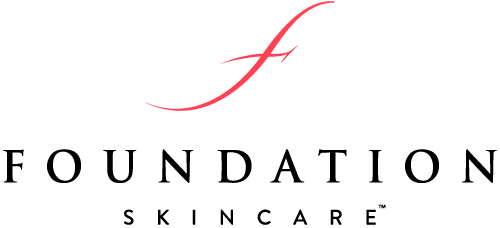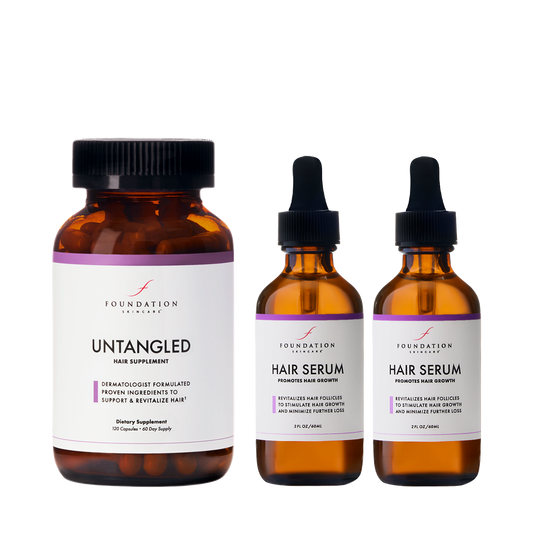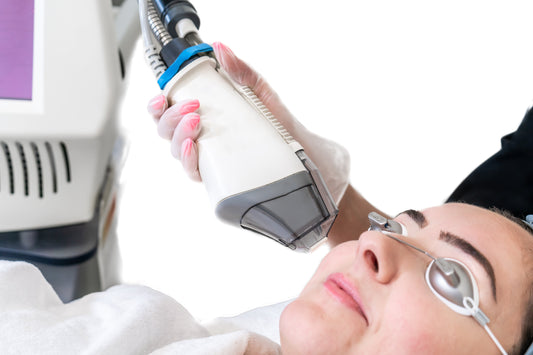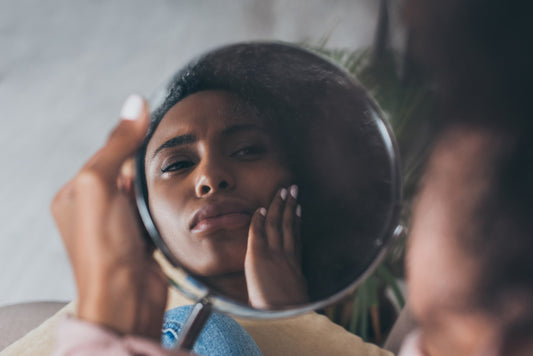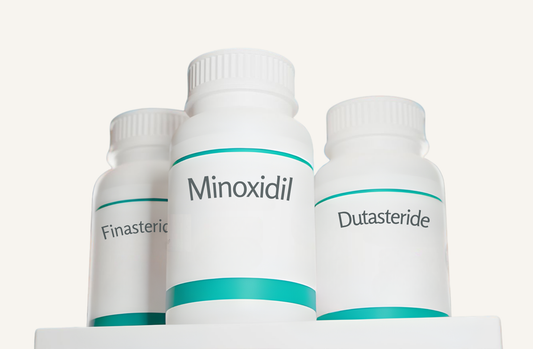Menopause comes with a lot of changes, and that can sometimes include hair loss. Studies have shown that a little more than half of all women will experience some sort of hair thinning or loss during perimenopause and menopause.1 Hormonal changes, especially when it comes to estrogen levels, can affect the hair follicle, leading to everything from a loss of volume to changes in texture.
While this is less than ideal, the good news is that it’s only temporary, and hair loss can grow back post-menopause. More good news: there are some things you can do in the moment to prevent, curb, or lessen the hair loss. Keep reading to find out more about why menopause causes hair loss, tips on how to spot and prevent it, and what you can do to deal with it.
Understanding Menopause-Related Hair Loss
In the years leading up to and during menopause, there is a dramatic shift in female sex hormones, contributing to a wide variety of emotional and physical changes. These hormonal changes, along with aging, can affect your hair follicles, which are small organs under the skin that contain the root of the hair. Hair loss can occur during any of the three menopause stages: perimenopause (which can last for up to 10 years before menopause), menopause, and post-menopause (which continues after menopause until end of life).
Hair loss during menopause will be different for everyone. Some women won’t experience or notice anything at all, while some women will notice a general thinning of their hair or even a widening of their part. While estrogen is believed to play a large part in menopause-related hair loss, there are other factors to take into consideration as well.
Hormone Fluctuations
Researchers believe that hormonal changes are the main cause of hair loss during menopause. A decline in estrogen levels can be related to hair thinning, changes in texture, and loss of volume. As estrogen and progesterone levels decrease, androgen levels will increase. Studies have found that higher levels of androgens, like testosterone and dihydrotestosterone (DHT), have been found in women dealing with this type of hair loss.
Genetics and Stress
Genetics can play a role in how little or how much hair loss a woman experiences. If you notice a pattern of hair loss in your family (both in males and females), this could be a sign that you’ll also experience it. Dealing with a lot of stress can exacerbate hair loss as well.
Diet
Missing out on essential nutrients in your diet may also be an issue when it comes to this type of hair loss. Research has found that proteins, fats, carbohydrates, and C, B, and A vitamins can all have an effect on the hair.
Aging
Menopause and aging go hand in hand, and the natural aging process is also something that can contribute to hair loss.
Identifying Signs & Symptoms
Sometimes menopause-related hair loss can be very obvious, and other times, it may take a long time to notice it (if you do at all). According to Cleveland Clinic, you should keep an eye out for these signs and symptoms:
- Noticing that more of your hair is falling out on a daily basis
- Having obvious patches of thinning or missing hair, especially near your part
- Feeling hair break off
- Being able to see your scalp skin through your hair
Exploring Preventative Measures
While preventing hair loss completely may not be possible, you don’t have to sit back and do nothing. The below tips can help minimize or improve menopausal hair loss.
Eat a Nutrient-Rich Diet
Research has shown that a well-balanced diet plays a key role in the growth and maintenance of your hair. Proteins, fats, and carbs should be part of your daily diet. Folates and vitamins C, B, A, and D can all contribute to hair health, as do minerals such as zinc, iron, magnesium, selenium, calcium, and copper. Make sure your diet consists of foods rich in these nutrients, such as:
- Vegetables such as broccoli, brussels sprouts, kale and spinach
- Fruits such as berries and kiwis
- White beans and other legumes
- Eggs
- Beef and pork
- Fish
- Dried apricots and figs
- Nuts
- Whole grains
Try Supplements
As we already mentioned, vitamins and minerals are essential for proper hair health. Aside from the ones we already discussed, biotin and niacin are also important. Look for a supplement containing these nutrients. Foundation Skincare’s Untangled Hair Supplement is a supplement that is very thoughtfully formulated with specific amounts of each ingredient to ensure you get the correct amount. It can be taken with your daily multivitamins and is clinically proven to help boost hair health and regrowth. It contains many of the vitamins and minerals we talked about, plus more:
- Horsetail extract: Stimulates hair growth and acts as a natural conditioner
- Biotin: Prevents breakage
- Vitamin E: Promotes scalp health and protects hair against damage
- Saw palmetto: Blocks DHT, a hormone related to testosterone that can shrink follicles and may contribute to hair loss
Reduce Stress
Stressing over hair loss (and anything else) can just make things worse. Instead, try to focus on relaxation as much as possible. Mindfulness practices, like meditation, can be helpful. Research has shown that physical exercise can also be a great way to relieve stress and anxiety and can even be associated with more emotional resilience. One 2020 review found that exercise significantly decreased anxiety symptoms in adolescence, and a 2021 study that looked at high school students found that even just 10 minutes of exercise resulted in lower stress levels. Make the time to do things you enjoy as well.
Take Medication or Try a Treatment
In some cases, medication or professional hair treatments may be needed. Light therapy and microneedling can be helpful if you’re dealing with severe hair loss. Minoxidil (best known as Rogaine) is an over-the-counter medication that can help stimulate hair growth and can be a potential solution.
Another option is Foundation Skincare’s Hair Serum, a dermatologist formulated product meant to nourish hair follicles, minimize hair loss, and stimulate hair growth from the root of the follicle. It’s minoxidil-free, so it can be less irritating and doesn’t cause as much shedding. While the UnTangled supplement will improve hair from the inside, the Hair Serum can visibly improve hair fullness, thickness, and health. It’s made with nutrients like:
- Niacin: Improves blood flow to supply oxygen to follicles
- Rooibos: Removes dead skin cells that block follicles
- Stimucap: Reduces hair shedding
- Menthol: Stimulates the scalp to open follicles and encourage growth
UnTangled Essentials Kit
• Engineered to work in tandem
• Visibly fuller hair in 90 days
$155
Sale price
$124
When to Seek Professional Guidance
Some women may be able to manage menopausal hair loss on their own, but in some cases it’s best to consult a doctor or dermatologist. If you notice that you are rapidly losing a lot of hair, experiencing pain, or have an itchy or red scalp, you should reach out to a professional to talk about your options.
Embracing Confidence & Self-Care
Whether your hair is simply less voluminous than it used to be or you’re able to see your scalp through your hair, hair loss can be a difficult experience to go through, temporary or not. Along with taking steps to prevent or lessen hair loss and promote hair health, you can also focus on making yourself feel good.
Getting a new haircut can be a fun way to make a change that distracts from the other changes going on. A new haircut or hairstyle may help hide thinning, shedding, or patches in your hair. You should also get into a gentle hair care routine that works for you. For example, massaging your scalp during or before a shower can be a great way to stimulate the scalp (and potentially aid in air growth), and it also feels relaxing. Use a new shampoo and conditioner that helps boost volume, and opt for gentle products that will keep hair strong.
Find more tips and resources on maintaining healthy hair and skin in the FS Blog.
References:
1 https://foundationskincare.com/blogs/articles/what-is-postpartum-hair-loss
2 https://www.ncbi.nlm.nih.gov/pmc/articles/PMC10669803
3 https://www.nia.nih.gov/health/what-menopause
4 https://www.ncbi.nlm.nih.gov/pmc/articles/PMC10669803
5 https://www.womens-health-concern.org/wp-content/uploads/2022/12/16-WHC-FACTSHEET-MenopausalHairLoss-NOV2022-B.pdf
6 https://www.ncbi.nlm.nih.gov/pmc/articles/PMC4828511/
7 https://my.clevelandclinic.org/health/diseases/16921-hair-loss-in-women
8 https://www.ncbi.nlm.nih.gov/pmc/articles/PMC4828511/
9 https://www.ncbi.nlm.nih.gov/pmc/articles/PMC4013452/
10 https://pubmed.ncbi.nlm.nih.gov/32342469/
11 https://www.frontiersin.org/articles/10.3389/frvir.2020.598506/full
